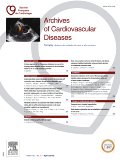
Archives of Cardiovascular Diseases
Scope & Guideline
Connecting clinicians and researchers for a healthier heart.
Introduction
Aims and Scopes
- Clinical Cardiology and Management:
Focused on the diagnosis, treatment, and management of cardiovascular diseases, including acute and chronic conditions such as coronary artery disease, heart failure, and arrhythmias. - Cardiovascular Imaging and Diagnostics:
Dedicated to advancements in imaging techniques and diagnostic methodologies, including echocardiography, cardiac magnetic resonance imaging, and novel biomarker assessments. - Interventional Cardiology:
Covers research related to catheter-based interventions, transcatheter aortic valve implantation (TAVI), and other minimally invasive procedures for treating cardiovascular diseases. - Cardiovascular Pharmacotherapy:
Explores the use of pharmacological agents in managing cardiovascular conditions, including the efficacy and safety of new drugs and treatment regimens. - Epidemiology and Public Health:
Investigates the epidemiological trends, risk factors, and public health implications of cardiovascular diseases, contributing to a better understanding of disease prevention and management strategies. - Innovative Therapies and Technologies:
Focuses on the development and evaluation of innovative therapies, including gene therapy, stem cell treatments, and emerging technologies in cardiovascular care.
Trending and Emerging
- Remote Monitoring and Telemedicine:
With the rise of digital health technologies, there is an increasing focus on remote monitoring of patients with cardiovascular diseases, particularly in the context of managing chronic conditions and during the COVID-19 pandemic. - Artificial Intelligence and Machine Learning:
The application of AI and machine learning in predicting cardiovascular events and outcomes is gaining prominence, showcasing the integration of advanced analytics in clinical cardiology. - Personalized and Precision Medicine:
Emerging research is emphasizing personalized treatment approaches based on genetic, biomarker, and patient-specific data, aimed at optimizing therapeutic outcomes in cardiovascular care. - Cardiovascular Outcomes in Cancer Patients:
Research investigating the intersection between cardiovascular health and cancer management is becoming increasingly relevant, particularly as survival rates improve and long-term cardiovascular risks are recognized. - Heart Failure with Preserved Ejection Fraction (HFpEF):
The focus on HFpEF is growing, with studies exploring its pathophysiology, management strategies, and the impact of comorbidities, reflecting an urgent need to address this complex condition.
Declining or Waning
- Traditional Risk Factor Studies:
Research focusing solely on traditional cardiovascular risk factors, such as hypertension and hyperlipidemia, has seen a decline as newer studies explore more complex interactions and novel risk factors. - Historical Perspectives on Cardiovascular Diseases:
Papers that provide historical overviews or retrospective analyses of cardiovascular disease management are less frequent, possibly overshadowed by contemporary and forward-looking research. - Single-Center Studies:
The prevalence of single-center studies appears to be waning as multicenter and collaborative research efforts gain traction, providing more robust and generalizable findings. - Basic Science Research:
There is a noticeable decrease in publications focused solely on basic science and laboratory studies, as the emphasis shifts towards translational research that bridges laboratory findings with clinical applications. - Non-Cardiovascular Comorbidity Research:
Research examining comorbidities that are not directly related to cardiovascular outcomes has diminished, with a stronger focus on the interplay between cardiovascular diseases and other systemic conditions.
Similar Journals
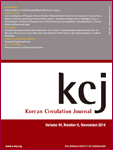
Korean Circulation Journal
Exploring the Frontiers of Cardiac Research and Innovation.Korean Circulation Journal, published by the Korean Society of Cardiology, has established itself as a prominent platform for disseminating research in the fields of Cardiology and Cardiovascular Medicine. With an ISSN of 1738-5520 and an E-ISSN of 1738-5555, this journal has been at the forefront of cardiovascular science since its inception in 2006 and is projected to continue until 2024. The journal's commitment to quality is reflected in its 2023 category quartiles, ranking in the second quartile (Q2) for both Cardiology and Internal Medicine, as well as its commendable Scopus rankings within the respective fields. Located in South Korea, the journal aims to bridge the gap between cutting-edge research and practical applications, serving as an invaluable resource for researchers, healthcare professionals, and students keen on advancing their understanding of cardiovascular health. Although currently not an open-access journal, it provides a wealth of knowledge that encourages evidence-based practice in clinical settings.

Minerva Cardiology and Angiology
Elevating standards in heart and vascular health research.Minerva Cardiology and Angiology, published by EDIZIONI MINERVA MEDICA, is a prominent journal in the field of cardiology and cardiovascular medicine, with an ISSN of 2724-5683 and E-ISSN of 2724-5772. Established in 2021, this journal aims to foster the dissemination of cutting-edge research, clinical practice guidelines, and innovative methodologies relevant to cardiovascular health. As of 2023, it holds a commendable Q3 quartile rank in its category, reflecting its growing influence within the scientific community. The journal is indexed in Scopus, where it ranks #221 out of 387 in its field, placing it in the 43rd percentile overall. Although it currently does not offer Open Access options, articles published in Minerva Cardiology and Angiology contribute significantly to ongoing discussions and advancements in heart and vascular health. The journal serves as an invaluable resource for researchers, healthcare professionals, and students seeking to stay informed on the latest developments in cardiology.

American Heart Journal Plus: Cardiology Research and Practice
Innovating Cardiovascular Health SolutionsAmerican Heart Journal Plus: Cardiology Research and Practice, published by Elsevier, is a prominent open-access platform dedicated to advancing knowledge in the field of cardiology. With an evolving ISSN of 2666-6022, this journal serves as a vital resource for cardiologists, researchers, and healthcare professionals, contributing to the ever-growing discourse surrounding cardiovascular health. With a mission to disseminate high-quality research and innovative practices from 2021 to 2024, it aims to bridge the gap between scientific research and clinical application. Though currently ranked #264 out of 387 in the medicine category for cardiology and cardiovascular medicine, its commitment to quality and accessibility exemplifies the journal's importance in fostering collaboration and knowledge sharing within the medical community. Researchers are encouraged to take advantage of its open-access model to ensure that groundbreaking developments in cardiology are readily available to all stakeholders in the field.

Cardiology Journal
Advancing cardiovascular knowledge without barriers.Cardiology Journal, published by VIA MEDICA, stands as a prominent resource in the field of cardiology and cardiovascular medicine, with an ISSN of 1897-5593 and an E-ISSN of 1898-018X. Recognized for its Open Access model established since 1994, this journal facilitates widespread dissemination of critical research findings, allowing practitioners and researchers globally to access valuable insights without barriers. Based in Poland, with an address at UL SWIETOKRZYSKA 73, 80-180 GDANSK, it has achieved a respectable Q2 classification in 2023 for both Cardiology and Miscellaneous Medicine categories, reflecting its influence and quality within the scholarly community. With a Scopus ranking placing it at #117 out of 387 in Cardiology, it lies within the 69th percentile, underpinning its commitment to advancing knowledge in cardiovascular health. The journal’s converged years extending from 2006 to 2024 ensure it captures ongoing developments in a rapidly evolving field. As such, the Cardiology Journal serves as an indispensable platform for researchers, professionals, and students dedicated to exploring the frontiers of cardiac science and improving patient care.

Pakistan Heart Journal
Elevating Cardiovascular Research in Pakistan and Beyond.Pakistan Heart Journal, with the ISSN 0048-2706 and E-ISSN 2227-9199, is a premier publication by the Pakistan Cardiac Society, dedicated to advancing the field of cardiology and cardiovascular medicine. Established as an Open Access journal since 2011, it provides a valuable platform for researchers and clinicians to disseminate innovative findings and insights within this critical area of health. Based in Karachi, Pakistan, at the National Institute of Cardiovascular Diseases, this journal aims to foster an enriched understanding of cardiovascular health by publishing rigorous research, case studies, and review articles. Despite its current categorization as Q4 in the latest 2023 quartiles and a rank of 357/387 in the Scopus database, it plays a vital role in the academic community, encouraging collaborative efforts and dialogue among professionals. The journal aspires to converge diverse perspectives and innovations in cardiology from 2019 to 2024, thereby enhancing the quality and scope of cardiovascular research in the region and beyond.
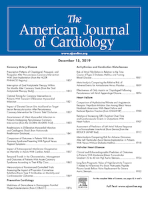
AMERICAN JOURNAL OF CARDIOLOGY
Driving Innovation in Heart Health and Clinical OutcomesThe American Journal of Cardiology is a leading peer-reviewed journal in the field of Cardiology and Cardiovascular Medicine, published by Excerpta Medica Inc-Elsevier Science Inc. Since its inception in 1958, the journal has consistently contributed to the advancement of cardiovascular research, providing a platform for groundbreaking studies and clinical findings that shape modern medical practices. With an impressive impact factor placing it in the Q1 category in its field for 2023, it ranks among the top journals in medicine, with a rank of #155 out of 387 in the Scopus database, reflecting its significance and rigorous editorial standards. The journal is committed to disseminating high-quality research that fosters innovation and enhances clinical outcomes in cardiology. Although it does not provide Open Access options, the American Journal of Cardiology remains an essential resource for researchers, healthcare professionals, and students looking to deepen their understanding of cardiovascular health.

Arquivos Brasileiros de Cardiologia
Connecting the global cardiology community through innovative research.Arquivos Brasileiros de Cardiologia is a leading open-access journal dedicated to advancing the field of cardiology and cardiovascular medicine. Established in 1950 and published by the ARQUIVOS BRASILEIROS CARDIOLOGIA, this Brazilian journal plays a crucial role in disseminating high-quality research that addresses both emerging and established topics in cardiovascular science. With an impressive history and a commitment to open access since 1997, it provides researchers, healthcare professionals, and students with free and readily available content that significantly contributes to the understanding and management of cardiovascular diseases. The journal is indexed in Scopus and holds a Q3 ranking in the category of Cardiology and Cardiovascular Medicine, demonstrating its relevance and participation within the global research community. Researchers can submit their work and access a wealth of information that spans a variety of subfields, reflecting the journal’s dedication to fostering innovation and collaboration within cardiology. With a mailing address at Avenida Marechal Câmara, 160-330 Centro, Rio de Janeiro, RJ 20,020-907, Brazil, the journal continues to serve as a vital platform for scholarly communication and knowledge exchange in the cardiovascular realm.
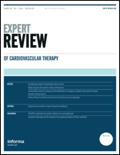
Expert Review of Cardiovascular Therapy
Enhancing Patient Care Through Rigorous ResearchExpert Review of Cardiovascular Therapy is a leading academic journal published by TAYLOR & FRANCIS INC, focusing on innovative and impactful research in the field of cardiovascular medicine. With an ISSN of 1477-9072 and an E-ISSN of 1744-8344, this journal serves as an essential resource for researchers, clinicians, and educators, offering a platform for the dissemination of critical advancements in cardiovascular therapy and internal medicine. Since its inception in 2003, the journal has maintained a reputable standing with a Q2 ranking in various categories including Cardiology and Cardiovascular Medicine, reflecting its influence and rigor in the field. The journal, which is based in the United Kingdom, does not currently offer Open Access options, ensuring that its content is accessible primarily to subscribers. With its commitment to high-quality, peer-reviewed articles, Expert Review of Cardiovascular Therapy is dedicated to bridging the gap between experimental research and clinical application, thereby enhancing patient care and therapeutic outcomes in cardiovascular health.
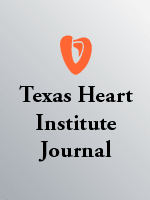
TEXAS HEART INSTITUTE JOURNAL
Empowering Healthcare Professionals with Essential Heart Insights.TEXAS HEART INSTITUTE JOURNAL, published by the renowned Texas Heart Institute, stands as a pivotal resource in the field of cardiology and cardiovascular medicine. With a history spanning over four decades since its establishment in 1982, this journal addresses a wide range of topics within its scope, including clinical studies, innovative treatments, and groundbreaking research in heart health. Despite its Q3 ranking in both Cardiology and Cardiovascular Medicine, the journal is committed to fostering advancement in medical knowledge and practice, providing an essential platform for healthcare professionals and researchers alike. While currently lacking open access, the journal is recognized for its contributions to the field, aiming to illuminate critical healthcare discussions and promote the exchange of ideas. For those interested in staying at the forefront of cardiovascular research, TEXAS HEART INSTITUTE JOURNAL offers invaluable insights and the latest developments shaping the future of heart care.

Journal of Cardiology
Advancing cardiovascular science for a healthier future.Journal of Cardiology, published by ELSEVIER, stands as a prominent resource in the field of cardiology and cardiovascular medicine. With a rich history since its inception in 1987, this peer-reviewed journal aims to disseminate cutting-edge research that enhances the understanding and treatment of cardiovascular diseases. Its 2023 ranking places it in the Q2 category within its discipline, reflecting its significance and impact, as evidenced by a Scopus rank of #123 out of 387 journals, positioning it in the 68th percentile of its field. The journal is headquartered in Japan, providing a unique perspective on cardiological advances relevant not only to the Asian continent but also globally. Though it does not currently offer open access, the Journal of Cardiology remains a vital institutional resource for researchers, clinicians, and students seeking to push the boundaries of cardiovascular science and improve patient outcomes.